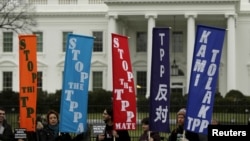President-elect Donald Trump said in a video message this week that he would pull the United States out of the Trans-Pacific Partnership trade agreement on his first day in office.
During the campaign, Trump had called several trade deals "disasters" and said flawed agreements had cost millions of U.S. manufacturing jobs.
The Trans-Pacific Partnership (TPP) is a deal among 12 Pacific Rim nations, including the United States, that would have covered about 40 percent of the world's gross domestic product — the production of all goods and services.
Economist and trade expert Gary Hufbauer of the Peterson Institute for International Economics says pulling the United States out of the TPP will be a big loss for Washington and a major win for Beijing.
China trade agreement
Hufbauer says China has been crafting a different trade agreement with some of the same nations participating in the TPP, increasing Beijing's influence at the expense of the United States.
Brookings Institution scholar Bill Galston calls failure to approve the TPP a "failure of American leadership" that boosts China.
But Republican Senator Dan Coats says China will have to "establish relationships" with Pacific nations that have some "real concerns" about their very large neighbor.
China's economic, political and military power has been growing.
Coats says regardless of TPP, some Pacific nations may maintain close relations with Washington.
Hufbauer says pulling the U.S. out of the TPP also means giving up about half a percentage point of economic growth for the world's largest economy. He says smaller economies like Vietnam and Malaysia will be hit far harder.
Critics of TPP
Critics of TPP, including Lori Wallach, director of Public Citizen's Global Trade Watch division, said the deal would have given too much power and too many benefits to multinational corporations at the expense of average people.
Wallach argued that the deal's rules would have made it harder for people to fight large companies in court and raise the cost of certain drugs.
Many U.S. unions also opposed the TPP, worried it might hurt wages and cut jobs.
TPP supporters say the deal included strong protection for labor rights, but that argument did not persuade the millions of voters who supported Trump.
Many environmental groups campaigned against the TPP.
Friends of the Earth applauded the plan to end U.S. participation, arguing that the deal was not about fair trade, but a chance for investors and big companies to "pollute our air and water."
Environmental considerations
TPP supporters insist the environmental part of the deal was the strongest such provision ever included in a trade agreement.
Trump says that after he pulls the U.S. out of the TPP, he will seek better, bilateral deals with trading partners.
Skeptics say every step toward a better deal for the United States will make it that much harder to persuade the leadership and citizens of U.S. trading partners to sign such agreements.




